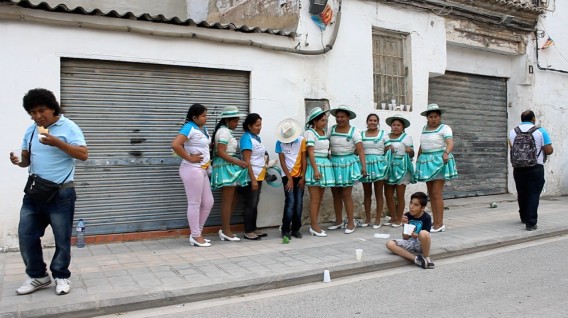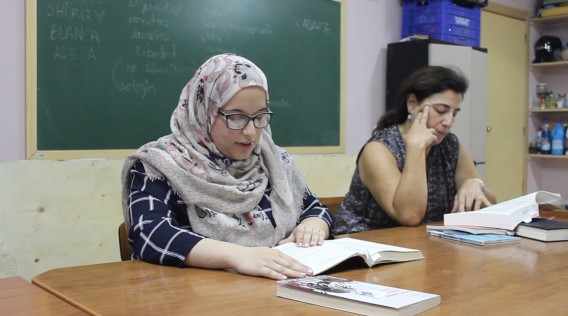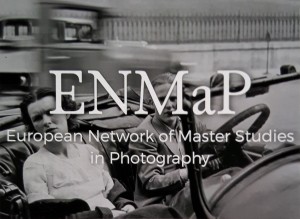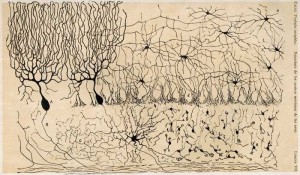In just three seasons, the activities of La Posta Foundation have gone from being mainly exhibitions of plastic arts/visual arts, incorporating an important educational and participative content, and, lately, a process of extension and ramifications, As a result of the collaboration with other friendly entities, as well as of the potential of the projects being developed, which unfolded showing aspects that, although implicit, had not developed their full capacity. The first milestone to be highlighted in this respect, was produced in the past season 2015-2016 with the Transforma Workshop: Cinema to come. Following a trail of the action Public to come, which had its first edition the previous year at La Posta Foundation, a practical workshop was held at the Municipal Center of Youth “Algiròs”, collectively developing several film documents related to space from the center. With this action the activities developed by La Posta are extended, in collaboration with the City council of Valencia, encompassing other geographical areas and developing conceptually.
Already in this season 2016-2017 there has been a real outbreak in this field, with trips back and forth. Rubén Marín, who had already participated in La Posta’s cinematographic activities, with the collaboration of the team of Cinema to come, presents his work “Documentary Process Orriols Lives Together”, which, following a line of processual and collaborative work, brings us to La Posta Foundation the reality of the neighborhood of Els Orriols of Valencia, through the problems, struggles and processes of the association Orriols Lives Together (from 17 to 27 November 2016). Shortly after (December 14, 2016), the presentation of the publication + video [In]Clots brought us closer to one of the most unique points in the neighborhood of El Cabanyal, El Clot. In this presentation, the roundtable “Urban Fractures” was held, in which different agents who lived close to conflicts in the coexistence of certain neighborhoods and who work for the inclusion of the diversities that inhabit them: Silvia Sánchez, from Cabanyal Horta; Natalia Coleto, of Fractals Art Education; Rocío Saborit, of Noah’s Ark, Nazareth; And Maria Sorribes, of MagaCim, the television of Benimaclet. [In]Clots is a work developed by students of the Master in Photography, Art and Technique of the Polytechnic University of Valencia (coordinated by Marta Fernández Gimeno), whose participation in La Posta anticipated what was to be the beginning of a wide and extensive collaboration with this Master, to be developed between January and April 2017 (this is the LABi project ―Laboratory of thought, creation and dissemination of the image―), within the framework of the Agreement signed between La Posta Foundation and Master in Photography, Art and Technique of the Polytechnic University of Valencia.
Within the framework of this Agreement, a large number of activities have been carried out, among which we must emphasize their importance in relation to the question we are dealing with ―the extent of the objectives of La Posta Foundation―, the exhibition “neXus. New looks in European documentary photography”, which has benefited from the Master in Photography belonging to the European Network of Master Studies in Photography (ENMap), which establishes a framework of collaboration with 8 European universities that multiplies the possibilities of La Posta dissemination, training, professionalization and internationalization.
In September 2016 an International Forum for innovation in teaching photography was held at the Polytechnic University of Valencia, in which the best experts in photography education from different countries participated. In this meeting where the future of photography was discussed, the European Network of Master Studies in Photography (ENMap) consortium was born. This network of 8 European universities with postgraduate studies in photography (University of Westminster, Aalto University School of Art, Design and Architecture Helsinki, Falmouth University, Leiden University, Plymouth University, Brussels Ecole de Recherche Graphique, London College of Communication And Universidad Politécnica de Valencia), is led by the Master of Photography at the Polytechnic University of Valencia. Its main objectives are the dissemination of the work of students and alumni of these universities, pedagogical innovation in photography, student and teachers exchange, generate work opportunities, disseminate and promote the work of alumni and collaborate in collective projects in which it can give visibility to the work of students of the universities of the consortium.
The exhibition “neXus. New looks in European documentary photography” has also been included in the official program of the PHOTON festival, curated by the students of the current edition of the Master of Photography of the Polytechnic University of Valencia (Ismael Marco Carrillo ―coordinator―, Silvia García Nieto, Andrés Mera Yagüe and Javier Sánchez Robres), with works by students from the different universities of the consortium (Louve Denis, Mikko Haiko, Heikki Humberg, Francisco Llop, Davide Meneghello, Blerim Racaj and Beccy Strong).
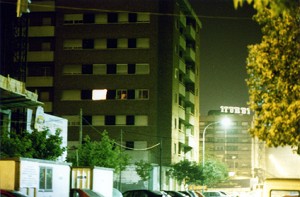 Pepe Miralles, “Secret and Modesty” (1995)
Pepe Miralles, “Secret and Modesty” (1995)
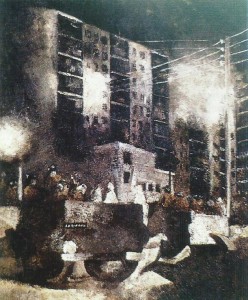 Amalia Avia, “The Night”, 1963
Amalia Avia, “The Night”, 1963
In this narrative of activities that have meant the extension and branching of the projects and objectives of La Posta Foundation, the case of the collaboration of Pepe Miralles and Pepa L. Poquet with the conversation/action “2009. Guillain-Barre” (27.2.2017), within the framework of FICAE 3 (International Festival of Short Films and Art on Diseases of the Polytechnic University of Valencia, 3rd edition), within the block “Spaces of reflection”, activities promoted by the Polytechnic University of Valencia with a role highlighted by the Chair of Art and Disease and the association Vincles. Pepe Miralles had already participated in the activities of La Posta Foundation in the exhibition “Museari: Aesthetics of Sexual Diversity”, with the work “Secret and Modesty”, 1995, before the discovery of antiretrovirals, a photographic work that was accompanied by a small text that begins: “When Juan Guillermo died, a group of friends had to empty his house…”. A political work, because accounting for what happens at night takes us back to the long vigil night of the Dictatorship of Franco, pending “It may be one night the elevator that always goes up will stop at your floor” [Raimon]. In this case, that uneasiness was experienced “the process of emptying a house as the “eviction” of life caused by a virus that enters your body to expel it” [Pepe Miralles]. Because an image refers us to another image, so we have to look for the genealogy of images, as Aby Warburg taught us, and we find that of “Secret and Modesty” in the work of Amalia Avia “The Night”, 1963, a oil on board. More connections in that same exhibition: the presence of a work by Nora Ancarola. In addition to the work in exhibition “Wound of Temps”, which shows an aged skin, this artist highlights in her resume the project Antikeres, with Marga Ximenez, on the ethics and aesthetics of the cure, because the cure is not just one burden that support women, but also another way of looking at the world. All the energy released with this experience would not fall on deaf ears, and a few months later it came back to materialize in the conversation held by Pepe Miralles and Pepa L. Poquet: “2009. Guillain-Barre”, having as a guideline the work/process of the latter “Ellipse”. There are still more connections and dendritic ramifications, because there is a work by Pepa L. Poquet, “Puig de Randa”, a video installation inspired by the Majorcan mountain of Puig de Randa, where the Cure Sanctuary is located. This video-installation, included in “Ellipse”, could be seen in Local Screen in Cinema to come 2014 in Las Naves CCC, that is, in the same frame in which the first public presentation of La Posta Foundation took place, by Miguel Ángel Baixauli.
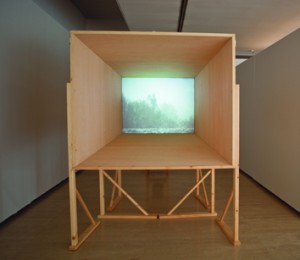 Pepa L. Poquet, “Puig de Randa” in Ellipse.
Pepa L. Poquet, “Puig de Randa” in Ellipse.
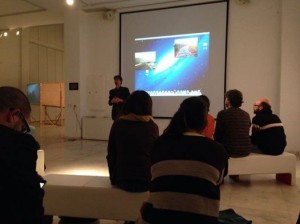 La Posta Foundation presentation on Local Screen at Cinema to Come 2014 in Las Naves CCC. In the background “Puig de Randa” by Pepa L. Poquet.
La Posta Foundation presentation on Local Screen at Cinema to Come 2014 in Las Naves CCC. In the background “Puig de Randa” by Pepa L. Poquet.
Finally, with the incorporation of Cine to come to La Posta’s programming, formalized in the Plan of Action for 2016 ―in the section on cinematographic/videographic activities―, the dissemination of La Posta Foundation’s objectives are spread through IVAM (Valencian Institute of Modern Art), Las Naves CCC and the Film Library of CulturArts Generalitat Valenciana.
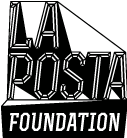
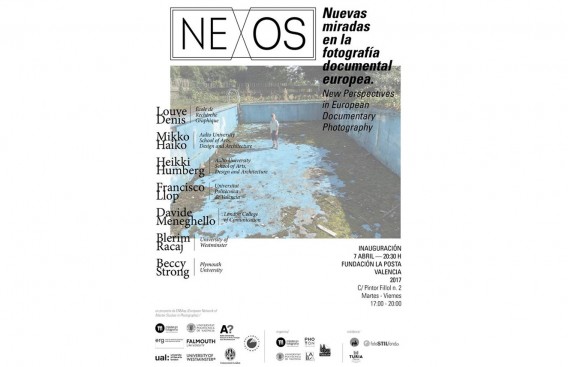
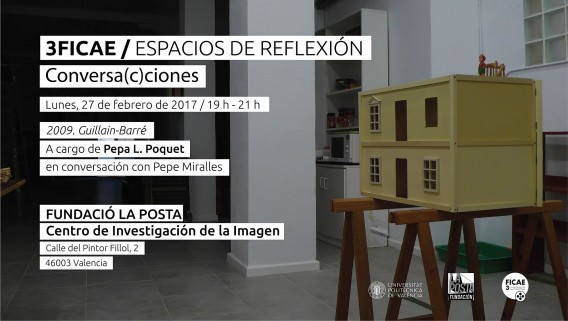
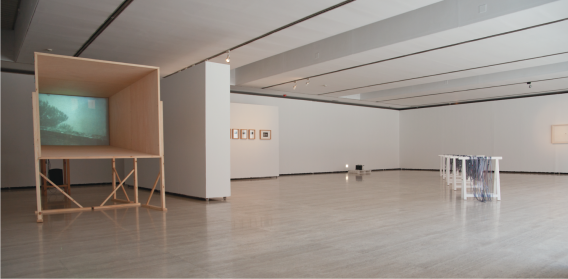
![[In]Clots](http://fundacionlaposta.org/wp-content/uploads/2017/03/inclots-4-568x377.jpg)
![[In]Clots](http://fundacionlaposta.org/wp-content/uploads/2017/03/16904604_806585089498171_5368675655112447081_o-568x379.jpg)
